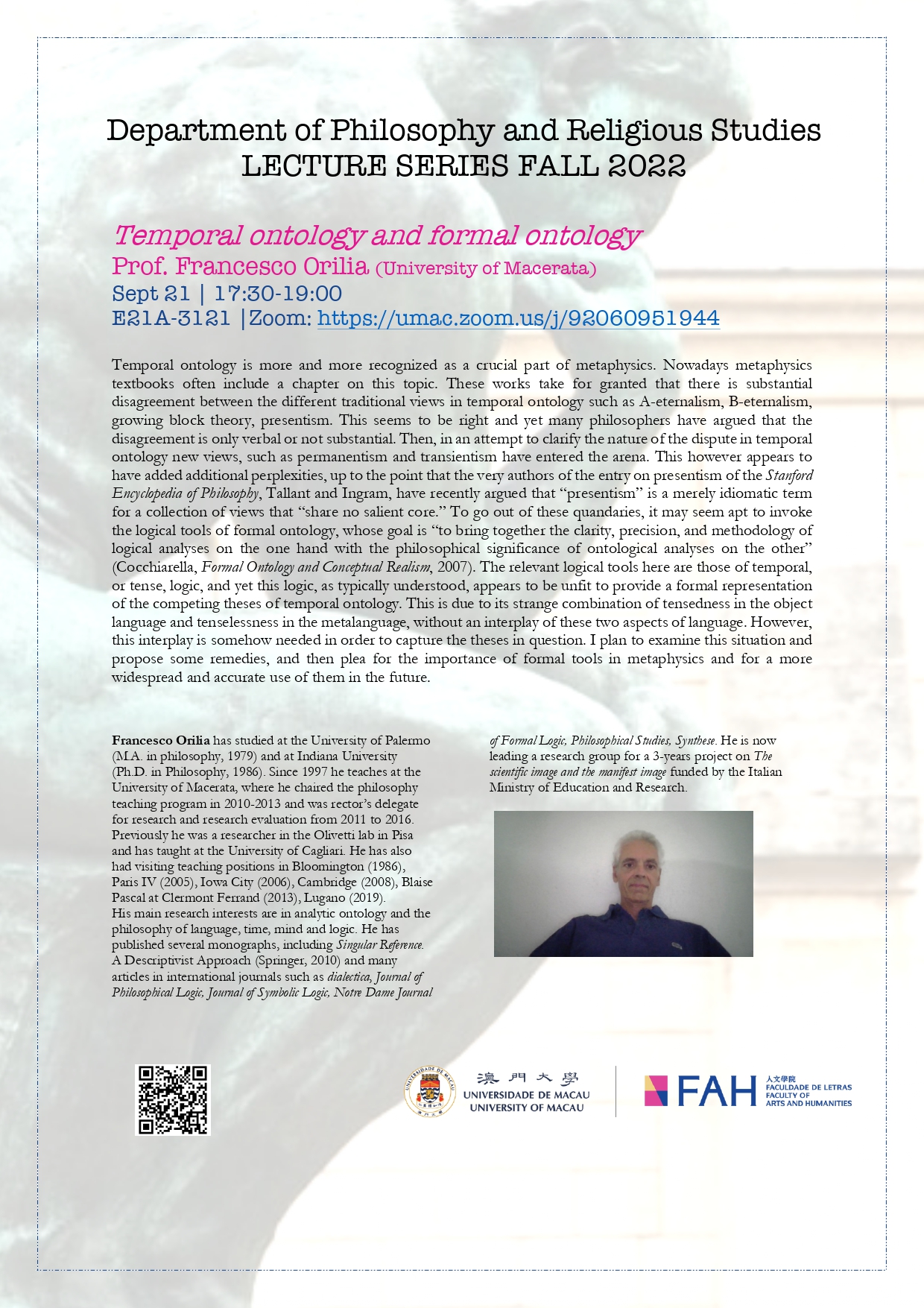

FAH/DPHIL Lecture Series – “Temporal ontology and formal ontology” by Prof. Francesco Orilia, University of Macerata, Italy
2022-09-21 @ 5:30 pm ~ 7:00 pm
Zoom: https://umac.zoom.us/j/92060951944
Abstract
Temporal ontology is more and more recognized as a crucial part of metaphysics. Nowadays metaphysics textbooks often include a chapter on this topic. These works take for granted that there is substantial disagreement between the different traditional views in temporal ontology such as A-eternalism, B-eternalism, growing block theory, presentism. This seems to be right and yet many philosophers have argued that the disagreement is only verbal or not substantial. Then, in an attempt to clarify the nature of the dispute in temporal ontology new views, such as permanentism and transientism have entered the arena. This however appears to have added additional perplexities, up to the point that the very authors of the entry on presentism of the Stanford Encyclopedia of Philosophy, Tallant and Ingram, have recently argued that “presentism” is a merely idiomatic term for a collection of views that “share no salient core.” To go out of these quandaries, it may seem apt to invoke the logical tools of formal ontology, whose goal is “to bring together the clarity, precision, and methodology of logical analyses on the one hand with the philosophical significance of ontological analyses on the other” (Cocchiarella, Formal Ontology and Conceptual Realism, 2007). The relevant logical tools here are those of temporal, or tense, logic, and yet this logic, as typically understood, appears to be unfit to provide a formal representation of the competing theses of temporal ontology. This is due to its strange combination of tensedness in the object language and tenselessness in the metalanguage, without an interplay of these two aspects of language. However, this interplay is somehow needed in order to capture the theses in question. I plan to examine this situation and propose some remedies, and then plea for the importance of formal tools in metaphysics and for a more widespread and accurate use of them in the future.
Bio
Francesco Orilia has studied at the University of Palermo (M.A. in philosophy, 1979) and at Indiana University (Ph.D. in Philosophy, 1986). Since 1997 he teaches at the University of Macerata, where he chaired the philosophy teaching program in 2010-2013 and was rector’s delegate for research and research evaluation from 2011 to 2016. Previously he was a researcher in the Olivetti lab in Pisa and has taught at the University of Cagliari. He has also had visiting teaching positions in Bloomington (1986), Paris IV (2005), Iowa City (2006), Cambridge (2008), Blaise Pascal at Clermont Ferrand (2013), Lugano (2019).
His main research interests are in analytic ontology and the philosophy of language, time, mind and logic. He has published several monographs, including Singular Reference. A Descriptivist Approach (Springer, 2010) and many articles in international journals such as dialectica, Journal of Philosophical Logic, Journal of Symbolic Logic, Notre Dame Journal of Formal Logic, Philosophical Studies, Synthese. He is now leading a research group for a 3-years project on The scientific image and the manifest image funded by the Italian Ministry of Education and Research.

